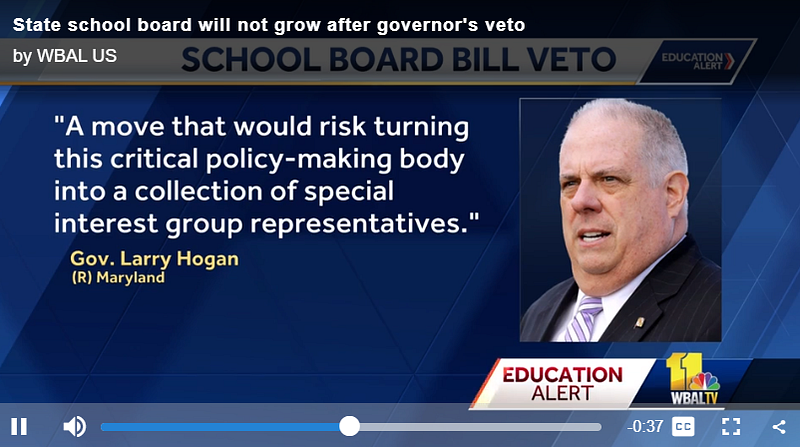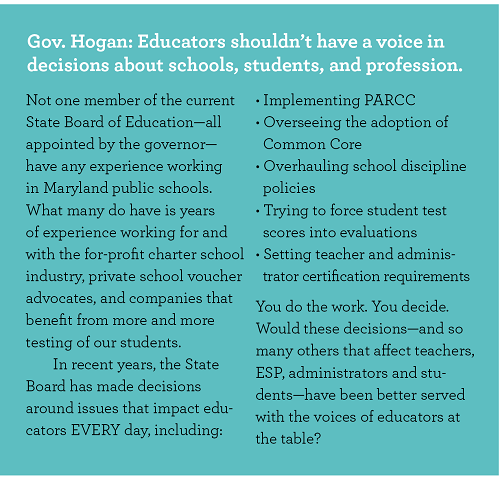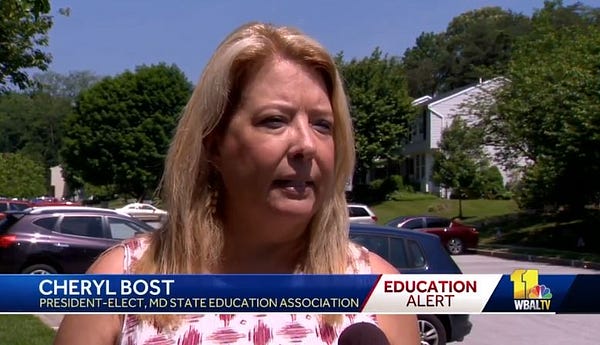Gov. Hogan: Educators Shouldn’t Have a Voice on the State Board of Education
Gov. Hogan blocked teachers from having a seat at the table.

The day before the Memorial Day holiday, Gov. Hogan vetoed bipartisan legislation that would have added two current teachers to the State Board of Education. He claimed that the bill would “move Maryland in exactly the wrong direction.”
Hogan said that teachers on the State Board would be “special interest group representatives” whose participation would be “in the interest of a few and not for the common good.”
REALLY? WOW.
MSEA has repeatedly sought to meet with Gov. Hogan to try and make sure that educators’ voices are heard by his administration. The day after Election Day 2014, MSEA President Betty Weller sent a letter to the governor stating:
Politics around education are never about Republicans versus Democrats, or Right versus Left. Rather, they are about what is right or wrong for our students. There are many areas where you and MSEA can and will agree, and I hope that together we can help our state and local school districts.
That letter, along with multiple other requests to meet and participate in our endorsement process, have been ignored by Gov. Hogan. So the governor’s latest effort to sideline the voices of educators is unfortunately not surprising.

“It’s the very definition of common sense that educators should be at the decision-making table when developing policies that affect our students,” said MSEA President Betty Weller.
“Gov. Hogan has failed to appoint a single public school teacher to his Board of Education and has now aggressively blocked the will of our elected lawmakers to make it happen. Our governor is sending a very clear message: He doesn’t believe teachers should have a voice in decisions about our schools, students, and profession.”

Vice President Cheryl Bost attends State Board meetings regularly. “It’s frustrating to hear discussions about class size, certification, grading, testing, and more discussed by State Board members who have no idea what educators face daily,” Bost said.
“When the board discussed the need for K–2 testing, some board members said that without a state assessment, teachers won’t know the academic progress of students in their classrooms. I’m a trained professional. I know my students’ academic strengths because I observe, interact, teach, and listen. I know when further diagnostic tools or interventions are needed. But without teachers on the State Board, there aren’t voices around the table who can make those commonsense points.”
MSEA believes that a direct path to empowering the teaching profession is by adding dedicated seats specifically for teachers and a parent of a public school student — and in passing the legislation, the General Assembly does, too.
That’s pretty darn reasonable.
So reasonable that it passed both the House and Senate with bipartisan support, including a 10–1 vote in the powerful Senate Education, Health, and Environmental Affairs Committee, where three of four Republicans voted in favor. But because of the timing of the governor’s veto and the upcoming election, the General Assembly can’t override his veto.
Former teacher Del. Eric Ebersole (D-Baltimore/Howard-District 12), was House sponsor of the legislation. “I know firsthand how disruptive it can be to have top-down mandates implemented without the input of experienced educators. I ran for a seat in the General Assembly because I know we need the critical classroom perspective that teachers offer in making decisions that impact our schools and our students. That’s why I was so satisfied to get bipartisan support in passing this legislation.
“It should be uncontroversial, and even a priority, to add two teachers to the state school board. Gov. Hogan should trust and value these hard-working professionals who help our kids make progress every day. I intend to work towards adding teachers to the State Board of Education in 2019.”

